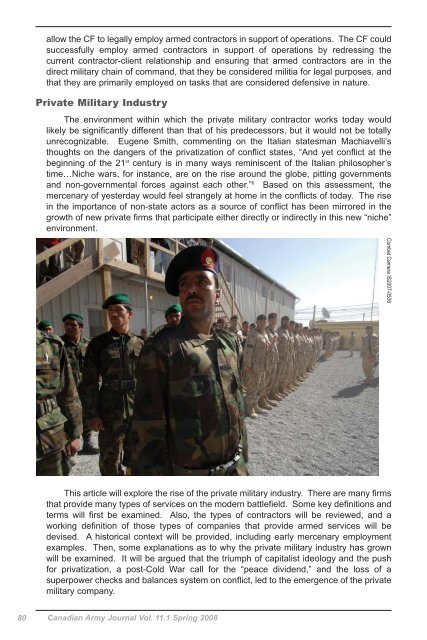The Canadian Army Journal
The Canadian Army Journal
The Canadian Army Journal
You also want an ePaper? Increase the reach of your titles
YUMPU automatically turns print PDFs into web optimized ePapers that Google loves.
80<br />
allow the CF to legally employ armed contractors in support of operations. <strong>The</strong> CF could<br />
successfully employ armed contractors in support of operations by redressing the<br />
current contractor-client relationship and ensuring that armed contractors are in the<br />
direct military chain of command, that they be considered militia for legal purposes, and<br />
that they are primarily employed on tasks that are considered defensive in nature.<br />
Private Military Industry<br />
<strong>The</strong> environment within which the private military contractor works today would<br />
likely be significantly different than that of his predecessors, but it would not be totally<br />
unrecognizable. Eugene Smith, commenting on the Italian statesman Machiavelli’s<br />
thoughts on the dangers of the privatization of conflict states, “And yet conflict at the<br />
beginning of the 21 st century is in many ways reminiscent of the Italian philosopher’s<br />
time…Niche wars, for instance, are on the rise around the globe, pitting governments<br />
and non-governmental forces against each other.” 6 Based on this assessment, the<br />
mercenary of yesterday would feel strangely at home in the conflicts of today. <strong>The</strong> rise<br />
in the importance of non-state actors as a source of conflict has been mirrored in the<br />
growth of new private firms that participate either directly or indirectly in this new “niche”<br />
environment.<br />
This article will explore the rise of the private military industry. <strong>The</strong>re are many firms<br />
that provide many types of services on the modern battlefield. Some key definitions and<br />
terms will first be examined. Also, the types of contractors will be reviewed, and a<br />
working definition of those types of companies that provide armed services will be<br />
devised. A historical context will be provided, including early mercenary employment<br />
examples. <strong>The</strong>n, some explanations as to why the private military industry has grown<br />
will be examined. It will be argued that the triumph of capitalist ideology and the push<br />
for privatization, a post-Cold War call for the “peace dividend,” and the loss of a<br />
superpower checks and balances system on conflict, led to the emergence of the private<br />
military company.<br />
<strong>Canadian</strong> <strong>Army</strong> <strong>Journal</strong> Vol. 11.1 Spring 2008<br />
Combat Camera IS2007-0536







![La modularite dans l'Armee de terre canadienne [pdf 1.6 MB]](https://img.yumpu.com/17197737/1/188x260/la-modularite-dans-larmee-de-terre-canadienne-pdf-16-mb.jpg?quality=85)









